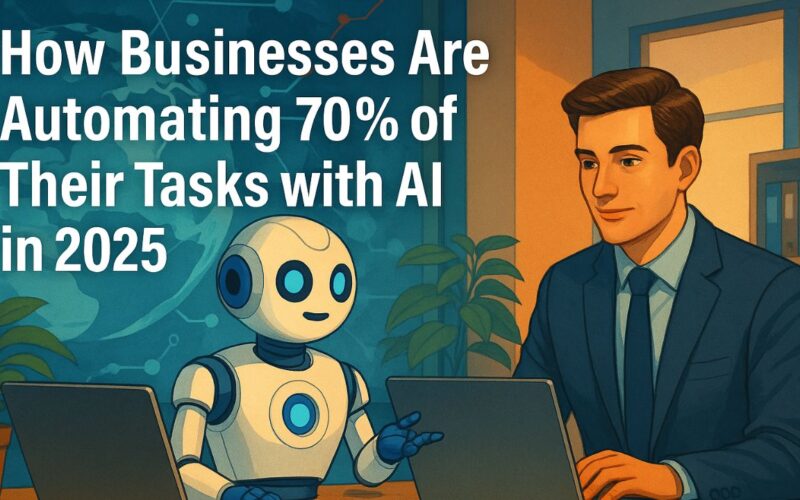If you are still manually handling every little task in your business, you are falling behind. The truth is, in 2025, smart companies are quietly automating up to 70% of their day-to-day operations not just to save time, but to move faster, scale leaner, and stay competitive.
And it is not about replacing humans. It is about removing the boring stuff so your team can focus on what actually moves the needle.
Let us walk through some real examples of how businesses are using AI right now to automate operations across content, support, finance, HR, and beyond.
How Businesses Are Automating 70% of Their Tasks with AI in 2025
Marketing and Content Creation Are Running on Autopilot
Writing blog posts, creating social media content, formatting newsletters, it all takes time. But AI tools like Team-GPT are making that process smoother than ever. They help generate blog outlines, SEO briefs, post drafts, and even repurpose older content to fit new platforms.
One SEO agency recently doubled its blog output from 80 to 160 articles a month just by automating research, outline generation, and formatting. That shift saved them over 85 hours every single month. Their team still adds the final human touch, but the heavy lifting? Done by AI.
Customer Support That Responds Before You Even Blink
Answering customer queries is important but also repetitive. In 2025, many businesses are letting AI chatbots and support agents handle the first line of communication. These bots do not just spit out canned replies. They actually pull information from your knowledge base, Google Drive, or project tools like Jira, so they can give real-time, relevant answers.
The result? Support tickets are resolved faster, response times drop dramatically, and your actual team gets to focus on complex cases that need human attention.
Expense Reports Without the Headaches
If you have ever wasted half an hour logging receipts manually, you are going to love this. With AI-powered expense tools, employees just snap a photo of a receipt. The system reads it, tags the category, and submits it for approval automatically.
Companies like Uber are saving hundreds of thousands of rupees in employee hours just by automating expense submissions. It is quicker, more accurate, and way less annoying for everyone involved.
Accounting and Payroll Practically Handle Themselves
For a lot of businesses, bookkeeping is the part that gets delayed until the last minute. But now, AI is making it a background process. Platforms are automatically pulling in transactions, reconciling records, generating invoices, and even managing payroll all with minimal human input.
One recent survey showed that 98% of accountants now rely on AI for things like data entry, portfolio updates, payroll, and even client communication. The time saved lets them focus more on advising and strategy instead of paperwork.
Business Processes That Run Without Constant Supervision
Robotic Process Automation (RPA) used to sound like something only big corporations could use. But in 2025, it is everywhere even in lean startups. RPA bots handle all sorts of behind-the-scenes processes, from report generation to order updates and system syncing.
Big brands like Coca-Cola are using AI to streamline supply chain operations, while IBM automates large volumes of transaction processing and customer service. But even smaller businesses are jumping in saving time by letting software handle the boring stuff while teams focus on growth.
No More Manual Data Entry or Copy-Pasting
Whether it is pulling info from invoices, resumes, or forms, AI can now read, understand, and input structured data directly into your ERP, CRM, or HR system. No more copying line by line or correcting typos.
Some companies have cut document processing costs by 90% and sped up internal workflows by nearly 80% just by letting AI extract and enter the data automatically.
Your Meetings Now Summarize Themselves
Meetings are important but what happens after is where things usually fall apart. Who remembers the action items? Who sends the summary?
Now, AI meeting agents like Recall.ai or OpenAI-powered workflows are handling all of that. They transcribe, summarize, and highlight next steps during or right after a call and then drop those notes straight into your project management system.
That means fewer missed tasks, better follow-up, and less time rewriting meeting recaps.
Technical Support Is Not Just for IT Teams Anymore
In many organizations, AI now handles routine IT issues like password resets, basic software installs, or connectivity problems without anyone needing to open a support ticket.
Vodafone, for example, uses generative AI to troubleshoot technical problems, run site assessments, and even perform root cause analysis. That has helped them drastically reduce support response times and lighten the load on their human IT teams.
Hiring and HR Workflows Are Finally Streamlined
Hiring is full of repetitive tasks: reviewing resumes, scheduling interviews, onboarding paperwork. AI can now do all of that and do it quickly.
Smart HR bots extract relevant candidate details, match them to job requirements, and automatically schedule interviews based on everyone’s calendar. Once someone is hired, onboarding checklists and systems get triggered without HR chasing people around.
This gives HR teams time back to focus on people, culture, and strategy not scheduling logistics.
Inventory and Supply Chain Are Getting Predictive
Managing stock and logistics used to be reactive. You waited until a problem hit then fixed it. Now, AI can analyze past sales patterns, seasonal trends, and market data to forecast demand, plan deliveries, and optimize inventory in real-time.
Businesses using machine learning models have improved forecasting accuracy by up to 50% and significantly reduced waste, shipping delays, and costs.
So… Can You Really Automate 70% of Your Business?
The answer is yes but it is not about doing everything at once.
The smart way to start is by identifying tasks that are repetitive, rule-based, and time-consuming. Once you have those in view, explore AI tools that plug into your existing systems your accounting software, your CRM, your project tools.
Begin with a few processes. Track how much time or money they save. Once those are stable, expand to other areas. And do not forget to check in regularly most AI tools give insights into what is working and what could be optimized.
The businesses that are winning in 2025 are not working harder. They are just building smarter systems.
Final Takeaway
AI is not some futuristic luxury anymore it is a practical tool for everyday work. From content to customer service, finance to hiring, small and large businesses alike are quietly automating massive chunks of their operations.
By getting the basics off their plate, they free up their teams to focus on what humans do best: solving problems, building relationships, and driving the business forward.
You do not need to automate everything overnight. Just get started.









